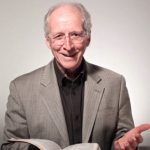 Dr. John Piper has written this short article entitled “Ten Reasons to Revel in Being Chosen.”
Dr. John Piper has written this short article entitled “Ten Reasons to Revel in Being Chosen.”
Peter said to the “elect exiles” — that is, to Christians scattered throughout the Roman Empire — “You are a chosen race, a royal priesthood, a holy nation, a people for his own possession” (1 Peter 2:9).
He meant it as an enormous encouragement for a tiny, beleaguered, persecuted minority in a vast sea of unbelief and growing hostility. The adversaries may seem powerful and numerous and dangerous and dominant. But look again. You are God’s chosen ones, a “people for his own possession.” O, dear suffering Christians, Peter would say, do you feel what that means? Revel in being God’s chosen ones! There are so many reasons!
1. Your faith is not the basis of God’s choosing you, but the result of it.
This means that your faith is a wonder — more wonderful than any of the seven wonders of the world. Jesus said, “You did not choose me, but I chose you” (John 15:16). And there was a deeper choosing going on here than just the selection of the Twelve. We know this because Judas was part of the twelve, and he was not “chosen.” Jesus said, “I am not speaking of all of you; I know whom I have chosen. But the Scripture will be fulfilled, ‘He who ate my bread has lifted his heel against me’” (John 13:18).
If you have come to Jesus, the wonder is that you already belonged to the Father, and the Father gave you to Jesus. You were not chosen because you came; you came because you were chosen. That’s what Jesus said, “All that the Father gives me will come to me. . . . Yours they were, and you gave them to me” (John 6:37; 17:6).
If you have believed on Jesus, the wonder is that you were first appointed to eternal life. You weren’t appointed because you believed; you believed because you were appointed. When the Gentiles heard that the gospel actually included them, “they began rejoicing and glorifying the word of the Lord, and as many as were appointed to eternal life believed” (Acts 13:48).
Revel in the wonder that you are a Christian because God chose you to be one. Your roots, as a child of God, are in eternity — in the infinite mind and heart of God. Your faith, and all its fruits, are God’s eternal gift.
2. Therefore, the basis of God choosing you is not in you, but in grace.
Take God’s Old Testament people Israel, for example. Why did God set his favor on Israel above all the peoples of the earth? What was the basis of God’s calling them, “my chosen” (Isaiah 45:4)? Here’s Moses’ answer:
The LORD your God has chosen you to be a people for his treasured possession, out of all the peoples who are on the face of the earth. It was not because you were more in number than any other people that the LORD set his love on you and chose you, for you were the fewest of all peoples, but it is because the LORD loves you and is keeping the oath that he swore to your fathers. (Deuteronomy 7:6–8)
This is amazing: “The LORD set his love on you and chose you . . . because the LORD loves you.” He loves you because he loves you! That’s the deepest, and ultimate, basis of God’s choosing Israel.
Paul underlines the wonder. Why was Jacob, the father of the nation of Israel, chosen over his twin brother Esau? Paul answers, “Though they were not yet born, and had done nothing either good or bad — in order that God’s purpose to choose might continue, not because of works but because of him who calls — their mother was told, ‘The older will serve the younger’” (Romans 9:11–12).
And the principle holds today, Paul would say, “So too at the present time there is a remnant, chosen by grace” (Romans 11:5). So it is with every true Christian. Behind our believing — behind our coming to Jesus—is grace alone. There is no ground for our being chosen beneath the all-wise and incomprehensible love of God. O the vastness of the repercussions of this unfathomable truth!
3. Since our faith and obedience is owing to God’s choice of us, we can know we are chosen.
It is a wonder that God’s unfathomable, eternal choice of who will be his children can be known by those he chose. Paul said that he knew the Thessalonian believers were God’s chosen ones. “We know, brothers, loved by God, that he has chosen you” (1 Thessalonians 1:4). Continue reading

